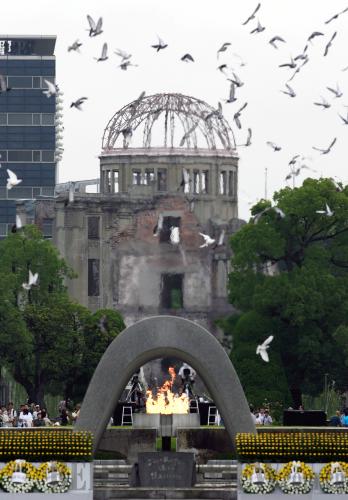|
 |
|
COURTESY OF CHEN XULONG |
Nuclear weapons changed the world of the 20th century. Their powerful force rewrote history.
Nuclear bombs dropped on Japan by the United States accelerated the collapse of Japanese militarism and hastened the end of World War II. The West led by the United States and the East bloc led by the Soviet Union started a bitter nuclear arms race that mutually assured destruction. The balance of terror between the two blocs stabilized in the Cold War and prevented the world from actual armed conflict, thus maintaining a long-term but occasionally uneasy peace in Europe and the world.
 |
|
FLIGHT FOR PEACE: Doves are freed at an assembly at the Hiroshima Peace Memorial Park on August 6, 2007 in memory of the victims of the dropping of the atom bomb on the city in World War II (REN ZHENGLAI) | Big countries with nuclear weapons strengthened their global influence and international status. Small countries with nuclear weapons changed their international security situations. Some countries constantly pursued nuclear dreams, while others sought the protection of the "nuclear umbrella" from nuclear powers. Floating on nuclear waves, the world was never calm.
After numerous conflicts, the Nuclear Non-Proliferation Treaty (NPT) and the Comprehensive Nuclear Test Ban Treaty (CTBT) were produced to constitute an important cornerstone of nuclear non-proliferation.
But non-proliferation suffered severe challenges from time to time. The world's nuclear nightmare never lessened. In order to save the world from this nightmare, the campaign for nuclear disarmament made its way forward despite difficulties. All these left an indelible mark on international relations during the 20th century.
Strategic changes
With the wish for peace, development and cooperation, we entered the 21st century. But the world is still not peaceful—and the nuclear shadow lingers. At the beginning of the 21st century, the September 11 terrorist attacks hit the United States and shocked the whole world. Anxiety spread over the combination of terrorism and nuclear weapons.
Currently, nine of the world's nations possess nuclear weapons and about 40 can extract highly enriched uranium. Disputes have constantly emerged in the nuclear issues of the North Korea and Iran. It is difficult to find a solution to them and the whole world is concerned.
Against this backdrop, the issue of nuclear security has become salient. Just as the Global Zero group said, nuclear weapons played a positive role in stabilizing the international situation during the Cold War, but today all the surplus value brought by nuclear weapons has been overshadowed by ever-growing nuclear proliferation and terrorist crises. The world is approaching a nuclear proliferation detonation point. Now the spread of nuclear weapons has gone beyond the strength meant to constrain them. The possibility of their use in state conflict, accidental events and terrorist organizations has increased.
As far as the United States is concerned, it might be terrorists or "rogue countries" that have moved or are going to move its cheese of nuclear security. In order to ensure its own security and strategic interests, the United States is also striving for changes. It plans to relocate the cheese.
U.S. President Barack Obama, of whose every pore was once regarded as emitting the scent of "change," tried to change the United States' original nuclear security and strategic concept soon after he took office. Based on antiterrorist goals, he tried to instill the dream of a nuclear-free world. And the whole world was about to be dragged into his dream all together.
Although the dream of a nuclear-free world had an obvious Obama color, it was a new American dream and had strategic ambitions. And it was pretty well-founded. Both conservatives and liberals gradually accepted the idea of Global Zero. It was the first time the two groups reached such an agreement on a nuclear-free world.
In addition, the United States can rely on other deterrents to safeguard security and strategic interests and ensure it maintains its position ahead of other countries. In February, U.S. Vice President Joe Biden said in a speech at the National Defense University in Washington, the United States had long relied on nuclear weapons to deter its enemies, but with scientific and technological developments, it could now achieve the same goal without using nuclear weapons.
What's more, the United States thought restoring its leadership in the world nuclear disarmament campaign would help it re-integrate into the world and strengthen its soft power. As nuclear weapons demonstrated the trend of proliferation, an ever-enlarging nuclear shadow required Obama put nuclear disarmament on top of his agenda.
The Americans were serious about the nuclear security issue. Obama announced steps to implement the plan of a nuclear-free world. For instance, the United States would conclude a new strategic arms reduction treaty through negotiation with Russia to cut dramatically the nuclear weapons arsenals of the two countries. It would also urge its Congress to approve the CTBT as quickly as possible, and strive to strengthen the NPT with other countries, including intensifying verification, strengthening sanctions against countries violating it and seeking a new mechanism for the peaceful use of nuclear energy. Further measures included ensuring fissile materials that can be used for nuclear weapons production will not be spread, and holding a world summit on nuclear security.
In addition, the United States also sought to reach an international treaty aimed to end the production of fissile materials, to ensure terrorists could never acquire nuclear weapons or nuclear materials.
The Washington Nuclear Security Summit on April 12-13 is a very important component of the whole plan.
| 